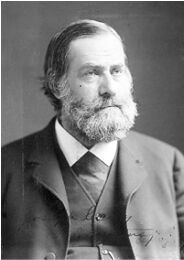
Joseph Leidy
September 9, 1823 - April 30, 1891Joseph Leidy was born in Philadelphia to an established family of wealthy extraction. He did not do so well with formal classroom education, preferring to be outside studying plants, insects, and other living organisms. He studied medicine at the University of Pennsylvania and graduated with a medical degree in 1844.
Leidy practiced medicine for only a few years before pursuing his passion for living organisms and paleontology. His most notable discovering was when he unearthed the first nearly-complete fossilized skeleton of a dinosaur. He named the specimen Hadrosaurus faulkii. He later authored the “Extinct Fauna of Dakota and Nebraska” in 1869, which contained many species not previously described or previously unknown in North America.
Leidy also studied parasitology, and was the first to determine that trichinosis was caused by a parasite in undercooked meat. As a pioneering protozoologist, he published the “Freshwater Rhizopods of North America,” a work still referenced today.
Leidy was a jack-of-all-trades, teaching anatomy at the University of Pennsylvania and natural science at Swarthmore College. He was the founder and head of the Biology Department at University of Pennsylvania from 1885-1891, the curator of the Academy of Natural Sciences in Philadelphia, the President of the Wagner Free Institute of Philadelphia, and the first President of the American Association of Anatomists.
For more about his life’s work, visit the University of Pennsylvania’s website. (http://www.archives.upenn.edu/people/1800s/leidy_joseph.html)
